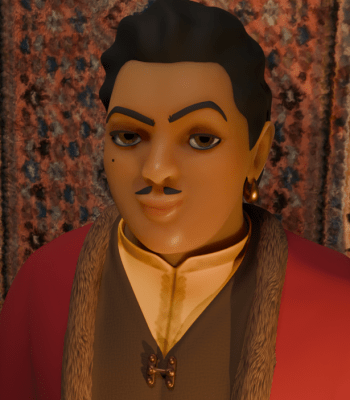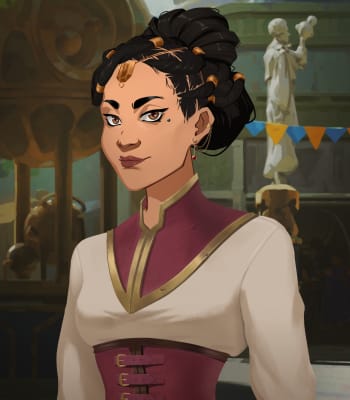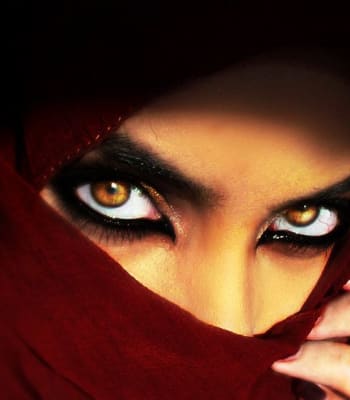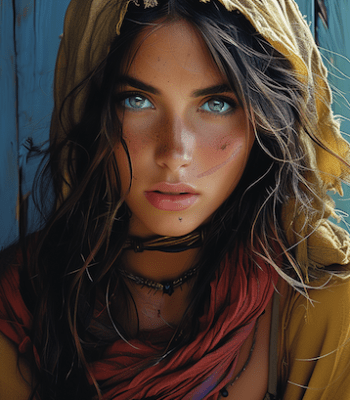I feel like it's time for me to swoop in here, because, quite honestly, it's not fair for me to leave Pilgrim out to dry as if limiting emote length is their particular pet idea. Pilgrim may agree with this to a good extent, but I am the real tyrant lurking in the shadows on this.
To me, a MUD is more like a play than a novel -- it's focused on quick-paced dialogue and action, with far less in the way of narration or detailed description. Of course there's no script to go off of in a MUD, which makes it improv acting instead of a formal play. And unlike the play script, which leaves most of the gestures and motion and the action itself up to the reader to simply imagine for themselves, we as writer-actors write that out too -- enough to bring our characters and their scene to life in a vivid and immediate way, but not so much that it detracts from the pace of the acting. For me, too much emphasis on writing detracts from the immediacy of the acting, and from the sense of inhabiting my character.
To me it's a huge impediment to my feeling of being my character, and acting and reacting in the moment, to have to carefully consider the flow and style of my every line of text. Is it pretty enough? Does it employ enough difference in phrasing so it doesn't sound too much like my last emote? Does it have a pleasing rhythm to it? Does it take into account, all at once, everything that is going on around me? Is it as lovingly crafted as the emote before mine?? Or is it stylistic trash??! Once I'm having thoughts like that, I'm not concentrating on the experience of being my character anymore and just saying what I think they would say and doing what I think they would do. I've gone off into the realm of prosecrafting rather than improv acting.
It's equally an impediment to my feeling of being my character to wait minutes in between responses -- either my mind is going to wander to something that is not my-character-in-the-world, or else I'm going to be thinking about my next several lines of prose. And then there's the awkwardness of having several lines -- of either speech or action -- which ought to take place over a few minutes and allow for multiple opportunities for reaction, instead all taking place in a single emote all outputted at once. And once it's done, you often feel that you have to react in kind, by writing several responses in one to respond to everything that was going on in the previous emote. To me, this no longer feels like a play, with action and reaction, speech and reply, following upon one another in quick interplay, back and forth responsively. It feels instead like time is proceeding in fits and starts, the play being perpetually paused, rewound a little, then unpaused, then paused again, over and over. And for me, all that is hard on my sense of really inhabiting my character.
If it were me emoting Illi's sample text, I would simply take exactly what was written and break it up into separate emotes:
Illi frowns, pensive. "I tend to model my emote style after my character and the game I'm playing," and here he pauses for a while, struggling with what to say.
"But specifically," he goes on, "the separate number of dialogue strings makes me QUITE uneasy."
"I feel much more comfortable splitting up my dialogue than I do with a giant block of text," he explains. "'You can't talk that much in one emote'," he furthers, though he's less bothered here.
"This also feels a little iffy, too, but removing the ability to split up my dialogue into more manageable chunks would really hinder me, at least." In the end, he shrugs.
Obviously there are any number of other ways to accomplish the same end -- which is to avoid long blocks of text of ANY kind, and instead put out shorter ones, at a faster pace, that give people a chance to respond and react in the moment. Because to me that's what gives a MUD -- or at least the MUDs I used to play -- their wonderfully unique sense of dynamism and improvization.
If your character has a long pause in the middle of saying something, why not have an actual pause between your says/emotes? If you have to stop and think about what to say or do, it's very possible your character would need to do so as well -- and that other things might happen or be said in the meantime. Separating things out into shorter emotes keeps dialogue and action more or less in real time, and other people can interject, interrupt, or go on with whatever they happened to be saying or doing in the meantime. Can this be a little bit chaotic? It can! But to me, it's chaotic in the way that a real, in-the-moment interaction with a bunch of people can be chaotic -- there is natural overlap and interplay, interruptions and misunderstandings, all created on the fly. To me, this feels natural and dynamic and wonderfully lively. For me, this is the heart of what I enjoy about roleplay.
We do have people from a lot of different roleplay cultures here, and everyone brings something valuable to the scene. There are wonderful little modes of expression that I've seen different people use, and pithy turns of phrase, both in dialogue and in describing action and expression and tone, and I love the thought that people clearly put into their characters. No two players are going to have the exact same roleplaying style -- unless it's horribly bland -- and there's a lot to enjoy and be inspired by in people's different ways of expressing themselves. So in short, it's not really anything about style per se -- it's about responsiveness and reactivity, and a continuous flow of interplay among characters all interacting in the moment.





 I just wanted to throw that out right quick as I recognize I am one of the prose-y... er players and I didn't want anyone to think I was offended by Mistsparrow's take. I'm not!
I just wanted to throw that out right quick as I recognize I am one of the prose-y... er players and I didn't want anyone to think I was offended by Mistsparrow's take. I'm not!
 The fact of the matter is that even if everyone leaves through alpha, Mistsparrow and I will no doubt continue quietly working on this project until perhaps it has met a new set of standards with documented guidelines that make it comfortable for anyone who wants to hop back into, and hopefully less bugs, and maybe more things to do in the world.
The fact of the matter is that even if everyone leaves through alpha, Mistsparrow and I will no doubt continue quietly working on this project until perhaps it has met a new set of standards with documented guidelines that make it comfortable for anyone who wants to hop back into, and hopefully less bugs, and maybe more things to do in the world.
